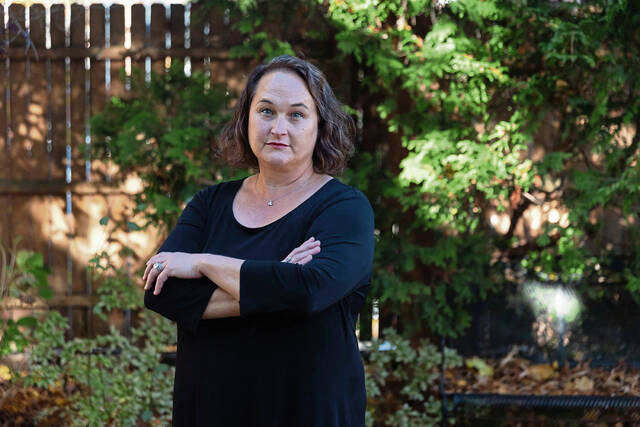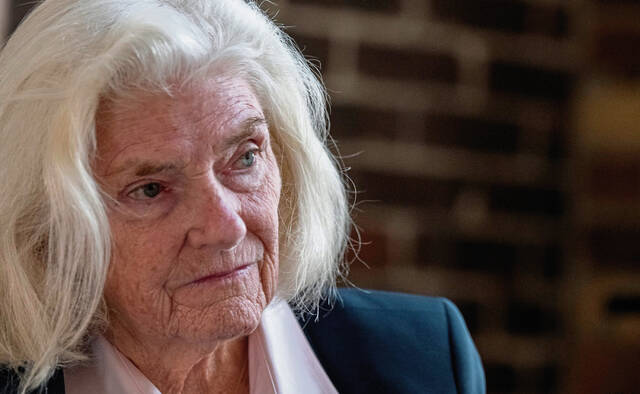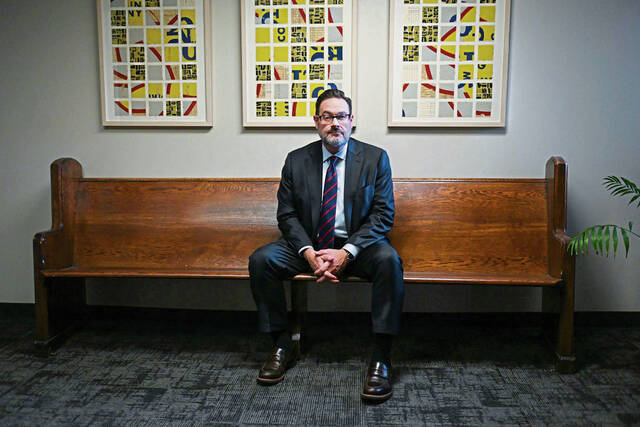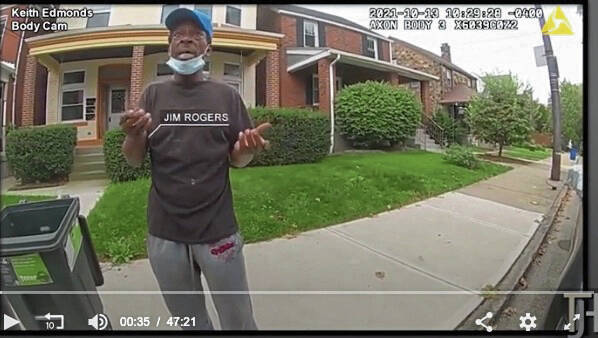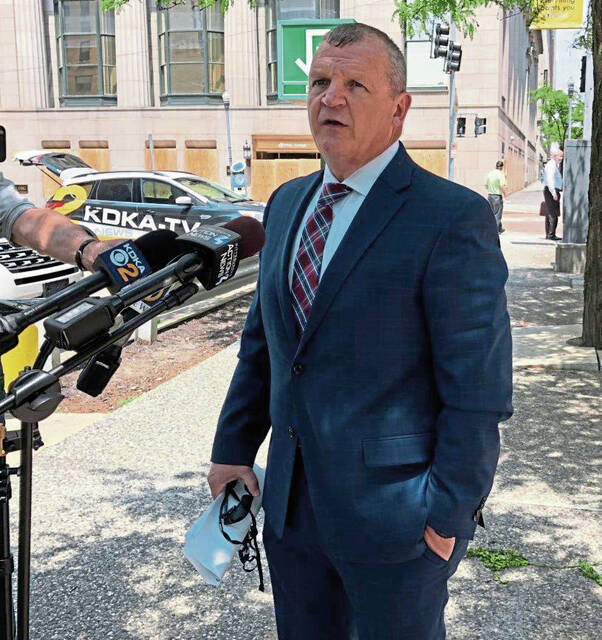Keith Edmonds zapped an unarmed homeless man so many times with his Pittsburgh police-issued Taser that the city paid an $8 million court settlement after the man died.
Aaron Fetty, another Pittsburgh police officer, was accused of sexually assaulting a co-worker while off duty.
Philadelphia police Lt. Marc Hayes texted a pornographic video depicting bestiality to two female subordinates, then asked one to lie to investigators.
Edmonds, Fetty and Hayes all were fired.
All are one court decision away from being reinstated, over the objections of their chiefs and their cities.
From one end of Pennsylvania to the other, these officers are examples of everything critics say is wrong with a potent state law known as Act 111. Unchanged since 1968, the law grants arbitrators enormous power to return fired police officers to duty against the wishes of mayors, municipal officials and police chiefs.
The courts are almost powerless to overturn an arbitrator’s binding decision except under a handful of rare circumstances.
To their unions, the officers are victims who deserve to get their jobs back. The law, they say, makes sure the right to due process is followed.
Detractors argue Act 111 has been warped over the decades, preventing police brass from weeding out bad cops, undercutting local leaders and eroding public trust in law enforcement.
David Harris, a University of Pittsburgh law professor, sees a clear message sent by the arbitration awards.
“It shows the public that the chief — the head of the police force — does not have the final word, even in the most egregious cases,” Harris said.
One Pittsburgh lawyer argues the system inherently favors bad cops.
Lisa Bennington, who represented the alleged victim in the Fetty case, noted arbitration panels are typically made up of three members — one chosen by the municipality, another by the police union and a neutral arbitrator, who inevitably becomes the swing vote.
“You’re down to one person,” Bennington told TribLive. “Why should one person decide your fate? What about a jury of your peers? That’s why we have a justice system.”
Whatever the perspective, one thing is certain: Absent media coverage or litigation, it can be difficult, if not impossible, to determine when a police officer is fired — and when that termination is undone by an arbitrator.
As a result, there’s no way to know how many officers like Edmonds, Fetty and Hayes, unwanted by their bosses but championed by their unions, are patrolling streets throughout the commonwealth.
In the dark
No public database tracks details about police officers in Pennsylvania who were fired or disciplined because of serious misconduct.
The state’s Labor Relations Board doesn’t monitor Act 111 cases. Neither does Pennsylvania’s Department of Labor and Industry or its Bureau of Mediation.
The Municipal Police Officers’ Education and Training Commission, created in 1974 to establish certification and training standards for municipal police in Pennsylvania, also has no public records related to Act 111, a spokesman told TribLive.
Attorney Christopher Gabriel said that’s only part of the problem.
“If there were a comprehensive data set, it would be easy to argue that the system should be changed,” said Gabriel, who has represented municipalities including Dormont trying to rid their communities of bad-apple officers through arbitration. “Almost as soon as we started with grievance arbitration in the public sector, we’ve had complaints about it.”
Some public officials have found themselves frustrated and helpless.
“On Act 111, I believe it should allow for the termination of officers whose actions violate public trust and established public policy,” Pittsburgh Mayor Ed Gainey said in a statement to TribLive. “We should never have a system that undermines the community’s trust, expectations of fairness and justice.”
Labor unions representing Pennsylvania State Police, as well as rank-and-file officers in Pittsburgh and Philadelphia, either refused to provide TribLive with case details or declined to comment altogether.
Annual reports for Pittsburgh police available online show 890 disciplinary actions against officers since 2010, but they don’t reveal how many have gone to arbitration.
Robert Swartzwelder, head of the Pittsburgh police union, estimates about 10% of all disciplinary actions in the city have been handled by arbitrators in recent years. But he refused to share details about how many involved terminations or were overturned.
Only 10 terminations are listed in annual reports from 2017 to 2019, and none has been reported since. At least one termination was overturned in that period. Pittsburgh police provided no details about that officer or the terms of the reinstatement.
Neither Edmonds’ termination nor Fetty’s is cited in the police bureau’s annual reports.
Elizabeth Pittinger, the longtime executive director of Pittsburgh’s Citizen Police Review Board, said officials know when arbitrators force municipalities to take back officers they’ve fired.
Often, though, the officials don’t tell anyone.
“The information is out there. It exists,” Pittinger said. “We just don’t have public access to it. And, in terms of government transparency, that’s bad public policy.”
Melissa Melewsky, media law counsel for the Pennsylvania NewsMedia Association, agrees the data exist.
“We know the agencies know what’s going on,” Melewsky said. “But publicly tracked? No. That burden is on the individual.”
Pittsburgh police Acting Chief Martin Devine declined an interview with TribLive about disciplinary matters. Cara Cruz, a Pittsburgh police spokeswoman, referred questions to Gainey, who also declined interview requests.
‘Behind closed doors’
Act 111 put arbitrators in charge of resolving contractual disputes for police in exchange for officers not striking. Their decisions are mostly untouchable.
Courts can overturn a ruling only when an arbitrator exceeds or lacks jurisdiction, deprives someone’s constitutional rights or presides over irregular proceedings.
Supporters say the process works. Some say the public doesn’t hear about when things go right, either by exonerating wrongly accused officers or eliminating politics from public safety decisions.
Defense attorney Phil DiLucente represented Pittsburgh police Sgt. Eugene Hlavac, who was charged with slapping the mother of his child so hard that he dislocated her jaw.
Although a civil court judge who granted the woman a restraining order found evidence Hlavac had assaulted her, a criminal court judge acquitted him based on the testimony of a neighbor who said the woman was an aggressor.
Hlavac started working as a Pittsburgh police officer in 1993 — and still does.
“For every one that you read about, there’s probably 500 you don’t hear about — the person put back on the rolls who never caused another problem,” DiLucente said. “The process we have in place works.”
Bennington, the lawyer, doesn’t buy it.
“How do we know?” she said. “It’s all behind closed doors.”
Bennington worries the lack of public record-keeping about arbitration matters keeps citizens in the dark.
Arbitration decisions are not the only police matter hidden from the public. Last year, a TribLive report showed how keeping the names of officers who use deadly force out of public view is part of a national phenomenon.
‘Fabricated lies’
Bennington represented the woman Hlavac struck and Fetty’s alleged victim.
In the latter case, Fetty and his Pittsburgh police colleagues drank alcohol at the end of their shift June 19, 2021, then went to a bar.
Fetty drove an intoxicated female co-worker home, according to Commonwealth Court documents. Nine days later, an anonymous complaint filed with the city alleged Fetty had sexually assaulted her.
The city and the Allegheny County Police investigated the claim. No charges were filed.
“These were all fabricated lies against me,” Fetty told reporters last year. “I never sexually assaulted her.”
Pittsburgh suspended Fetty for three days. The city fired him after a judge who granted the woman a restraining order found Fetty “at a minimum … committed the act of sexual assault against a fellow officer.”
An arbitration panel reinstated Fetty. The city appealed, but Commonwealth Court sided with the arbitration decision.
During the arbitration hearing, the police union argued Fetty’s termination was illegal because it occurred beyond the 120-day limit for disciplinary action under the union contract.
Pittsburgh argued there should have been an exception, both on technical grounds and because the arbitration decision was contrary to “public policy.” The city also argued it had a duty to protect the alleged victim.
But an appeals court said there was no fundamental change in the allegations of the case to merit the ruling being overturned.
The state Supreme Court has yet to decide whether to hear arguments in Fetty’s case.
Pennsylvania State Police, the commonwealth’s second-largest law enforcement agency, lost a similar public-policy argument in a 1995 case involving a trooper fired because of an off-duty domestic dispute. An arbitrator reinstated him.
The former trooper, Rodney Smith, had been drinking at a bar for more than six hours, according to court records. He saw an old girlfriend, who he said owed him about $30.
The two argued. Smith pulled his service revolver, forced it between the woman’s teeth and threatened to “blow off” her head, according to Commonwealth Court records cited by a state police spokesman. He drove away to continue drinking.
Smith was charged with three counts of DUI and one count each of simple assault and making terroristic threats. He pleaded guilty to the charges.
Smith was fired. An arbitrator later deemed that discipline excessive.
State police appealed “because it is incomprehensible that an arbitrator would put back to work a state trooper who, after drinking heavily, pulls his service revolver on a woman in the midst of a disagreement and threatens to blow her brains out,” court documents show.
A state police spokesman said Smith has not been a trooper since 2009 and declined further comment.
‘Unacceptable results’
In 2018, Philadelphia fired Hayes, the police lieutenant, for sexual harassment over texting the pornographic video to subordinates.
Four years later, an arbitrator reinstated Hayes with back pay, but his return to duty has been delayed as the appeals process plays out.
Last month, Craig Gottlieb, a lawyer for the city, argued against the reinstatement before the state Supreme Court.
“It’s not simply that we don’t like what the arbitrator’s decision is,” Gottlieb said. “Horrendous decisions have created problems — the message that is sent to the public is that the police can get away with this.”
Hayes’ defenders — Philadelphia’s Fraternal Order of Police Lodge No. 5 and attorney John Bielski — maintained that Act 111 gets it right. The law provides officers due process and the ability to argue their case to a neutral arbitrator, they said.
A spokesman for the 14,000-member Philadelphia police union declined to comment for this story.
The state Supreme Court justices are not debating the content of the allegations against Hayes. Instead, they’re interpreting whether an arbitrator violated state law by ruling to reinstate him.
Catherine Twigg, general counsel for Philadelphia’s Citizens Police Oversight Commission, told TribLive she worries about unelected arbitrators making final decisions about who can serve in some of the most critical public jobs.
“Nobody but a police chief is the one who should decide what behavior by officers is appropriate,” Twigg told TribLive.
Arbitrators have made about 100 decisions involving Philadelphia police officers since 2011, Twigg said.
The Fraternal Order of Police Lodge No. 1, which represents Pittsburgh’s rank-and-file officers, does not track those decisions, Swartzwelder, the union president, told TribLive.
In Philadelphia, at least 16 officers were fired for “improper” violence or use of force, according to the commission’s brief in the Hayes case. Arbitrators ordered reinstatement in 13 of those cases.
“For many years, this wrong and unworkable decision has produced unacceptable results,” Twigg wrote in a brief to the state’s high court. “Reinstating police officers who were fired by the police commissioner for serious misconduct undermines public trust in police.”
The Pennsylvania Chiefs of Police Association agrees arbitrators have too much say.
A brief it filed on behalf of Philadelphia in the Hayes case cited two studies showing officer discipline is frequently overturned through arbitration.
Nationally, between 2006 and 2020, a review of 624 cases involving terminated officers showed arbitrators reinstating them nearly half the time.
“The current standard grants arbitrators virtually unlimited power, thus hindering the city’s ability to discipline officers and ensure integrity within the police force,” the chiefs wrote in their brief.
“The decision to reinstate an officer despite egregious misconduct undermines public safety,” according to the brief. “The costs are more acute for communities of color, which bear the brunt of the consequences of misconduct from reinstated officers, thus exacerbating the effects of historical racism in policing.”
Defending the system
Arbitrator Walt DeTreux has been making decisions on police discipline in the Philadelphia area for 27 years.
DeTreux, like his peers, won’t address specific cases. In his business, evidence of neutrality is the equivalent of a calling card.
DeTreux estimates he has handled hundreds of police arbitration cases and “about 5% grab headlines.” He said his decisions are about facts — not taking sides.
“The arbitrator doesn’t have skin in the game,” he said. “We’re the umpires in baseball. We don’t care who wins. We’re just calling the balls and strikes.”
Former Pittsburgh police Chief Robert McNeilly Jr. rose through the city’s police bureau in a 30-year career and led it for a decade until 2006. He told TribLive he still feels “officers need to be represented.”
“I certainly didn’t mind having to defend my position to an arbitrator,” McNeilly said. “If you’re going to take away someone’s livelihood, you should be able to prove you absolutely need to.”
He disagreed with the notion police chiefs should be the last word on discipline.
“I don’t think a chief should have the final say,” McNeilly said. “Everyone has a right to due process.”
Cameron McLay, who was Pittsburgh’s chief from 2014 to 2016, told TribLive he couldn’t recall any unjust — or even controversial — arbitration decisions during his tenure.
“Rather than focus on whether the system was broken,” McLay said, “I focused on internal measures.”
Three professional agencies representing arbitrators and mediators either declined comment for this story or didn’t respond to repeated inquiries.
Neither Pittsburgh officials nor the police union would release the names of arbitrators who have worked on previous cases.
Swartzwelder has an easy solution to addressing concerns about Act 111.
“My opinion is very unpopular,” Swartzwelder said. “If you want to do away with binding arbitration, give us the ability to strike.”
Getting the full story
Attorney Christopher J. Cimballa has handled disciplinary cases for Pittsburgh’s police union since 2017.
He said the binding arbitration process works. When it comes to discipline, he said, some cases simply are outliers.
“When you’re dealing with a termination, these are limited in number,” Cimballa said.
Swartzwelder said media coverage of cases does not necessarily tell the full story.
He cited the case of Edmonds, the former Pittsburgh police officer who is fighting before the state Supreme Court to regain his job.
Edmonds was dispatched to Bloomfield in October 2021 for a report of a possible stolen bicycle when he encountered Jim Rogers, a homeless man. Rogers became upset when Edmonds removed his wallet from his pants pocket. Over three minutes and 15 seconds, Edmonds deployed his Taser 10 times.
Rogers died the next day.
The city fired Edmonds, an arbitrator reinstated him, and an appeal is now at the state Supreme Court.
Gainey has called efforts to bring Edmonds back “deeply disappointing.” But Swartzwelder has steadfastly supported the reinstatement.
“Do not judge the Edmonds case based on media reporting, where it’s impossible to cover the entire record,” Swartzwelder told TribLive.
Swartzwelder cited two details he said supported his stance on Edmonds.
Though Edmonds deployed his Taser 10 times, its prongs connected to Rogers and shocked him only twice, Swartzwelder claimed. That, he said, is within the parameters of police bureau policy.
Swartzwelder also stressed the Allegheny County Medical Examiner’s Office deemed Rogers’ death accidental — not a homicide.
Rogers had a condition where he was prescribed seizure medication, but lab tests indicated he didn’t have the drug in his bloodstream, according to Swartzwelder. The union leader said that condition might have played a role in Rogers’ death.
Swartzwelder did not elaborate.
“Edmonds is being judged by the outcome. He’s not being judged by his initial response,” Swartzwelder said. “If Jim Rogers didn’t die, this would’ve never made the news.”
Harris, the Pitt professor, finds the Edmonds case troubling. Not only was Edmonds fired, but an internal review also found policy and procedure violations by nine officers, including three supervisors.
Pittinger, of the Citizen Police Review Board, said whatever the argument for reinstating Edmonds, video of the encounter convinced her his actions were wrong and his temperament “left a lot to be desired for a police officer.”
“But if you don’t fire them properly,” she said, “they’re gonna come back.”


